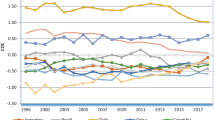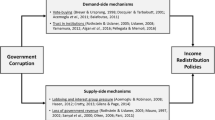Abstract.
This paper provides evidence that high and rising corruption increases income inequality and poverty. An increase of one standard deviation in corruption increases the Gini coefficient of income inequality by about 11 points and income growth of the poor by about 5 percentage points per year. These findings are robust to use of different instruments for corruption and other sensitivity analyses. The paper discusses several channels through which corruption may affect income inequality and poverty. An important implication of these findings is that policies that reduce corruption will most likely reduce income inequality and poverty as well.
Similar content being viewed by others
Author information
Authors and Affiliations
Additional information
Received: March 2, 2000 / Accepted: September 20, 2001
Rights and permissions
About this article
Cite this article
Gupta, S., Davoodi, H. & Alonso-Terme, R. Does corruption affect income inequality and poverty?. Econ Gov 3, 23–45 (2002). https://doi.org/10.1007/s101010100039
Issue Date:
DOI: https://doi.org/10.1007/s101010100039




